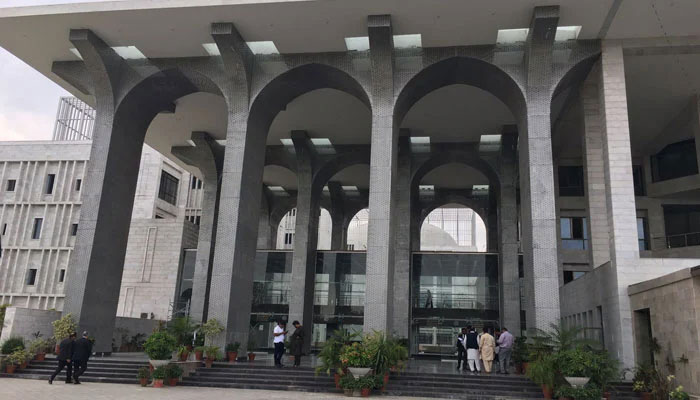IHC sets aside decision not to promote officer to Grade-21
Court directs Central Selection Board to consider Hassan’s promotion under Civil Servants Promotion Rules in its next meeting
ISLAMABAD: The Islamabad High Court (IHC) has set aside the decision of the Central Selection Board not to promote a grade 20 officer to grade 21 on the basis of intelligence reports.
The court said that it is surprising how a prime minister can allow this to happen carelessly, and how he can leave his bureaucracy at the mercy of such intelligence reports without evidence. The court asked how the PM can expect his bureaucracy to serve the government in these circumstances. IHC Justice Sardar Ejaz Ishaq Khan issued a written decision allowing the petition of Mohammad Tahir Hassan against his non-promotion to grade 21, declaring the Central Selection Board’s decision of August 1, 2023, to supersede the petitioner and promote an officer with low marks null and void.
The court directed the Central Selection Board to consider Hassan’s promotion under the Civil Servants Promotion Rules in its next meeting, observing that the board should not care about an intelligence report in which the officer has not had an opportunity to defend himself at departmental level.
The court said that according to the petitioner, he had a brilliant career from 1994 to 2022, and his secretary recommended his promotion. The petitioner’s credibility was questioned in the intelligence reports, on whose basis someone with lower marks was given preference over the petitioner for promotion.
The court said that it was admitted that the intelligence reports about the petitioner were brought before the Central Selection Board for the first time.
The ISI report described the petitioner as corrupt and unfit to work under pressure. The IB in its report mentioned the petitioner’s financial irregularities and a departmental inquiry. The court said that instead of providing evidence and confirming it in the intelligence reports, the word “reportedly” was written.
The court said no one knows how the intelligence reports were collected, and how such evidence was found which was contradictory to the excellent service record and reputation of the petitioner.
An intelligence officer sitting in the office and making random phone calls or through diligent intelligence work collected this evidence. The court said that not giving an opportunity to defend against an allegation is a serious violation of fundamental rights.
-
 Prince William Questions Himself ‘what’s The Point’ After Saudi Trip
Prince William Questions Himself ‘what’s The Point’ After Saudi Trip -
 James Van Der Beek's Friends Helped Fund Ranch Purchase Before His Death At 48
James Van Der Beek's Friends Helped Fund Ranch Purchase Before His Death At 48 -
 King Charles ‘very Much’ Wants Andrew To Testify At US Congress
King Charles ‘very Much’ Wants Andrew To Testify At US Congress -
 Rosie O’Donnell Secretly Returned To US To Test Safety
Rosie O’Donnell Secretly Returned To US To Test Safety -
 Meghan Markle, Prince Harry Spotted On Date Night On Valentine’s Day
Meghan Markle, Prince Harry Spotted On Date Night On Valentine’s Day -
 King Charles Butler Spills Valentine’s Day Dinner Blunders
King Charles Butler Spills Valentine’s Day Dinner Blunders -
 Brooklyn Beckham Hits Back At Gordon Ramsay With Subtle Move Over Remark On His Personal Life
Brooklyn Beckham Hits Back At Gordon Ramsay With Subtle Move Over Remark On His Personal Life -
 Meghan Markle Showcases Princess Lilibet Face On Valentine’s Day
Meghan Markle Showcases Princess Lilibet Face On Valentine’s Day -
 Harry Styles Opens Up About Isolation After One Direction Split
Harry Styles Opens Up About Isolation After One Direction Split -
 Shamed Andrew Was ‘face To Face’ With Epstein Files, Mocked For Lying
Shamed Andrew Was ‘face To Face’ With Epstein Files, Mocked For Lying -
 Kanye West Projected To Explode Music Charts With 'Bully' After He Apologized Over Antisemitism
Kanye West Projected To Explode Music Charts With 'Bully' After He Apologized Over Antisemitism -
 Leighton Meester Reflects On How Valentine’s Day Feels Like Now
Leighton Meester Reflects On How Valentine’s Day Feels Like Now -
 Sarah Ferguson ‘won’t Let Go Without A Fight’ After Royal Exile
Sarah Ferguson ‘won’t Let Go Without A Fight’ After Royal Exile -
 Adam Sandler Makes Brutal Confession: 'I Do Not Love Comedy First'
Adam Sandler Makes Brutal Confession: 'I Do Not Love Comedy First' -
 'Harry Potter' Star Rupert Grint Shares Where He Stands Politically
'Harry Potter' Star Rupert Grint Shares Where He Stands Politically -
 Drama Outside Nancy Guthrie's Home Unfolds Described As 'circus'
Drama Outside Nancy Guthrie's Home Unfolds Described As 'circus'




